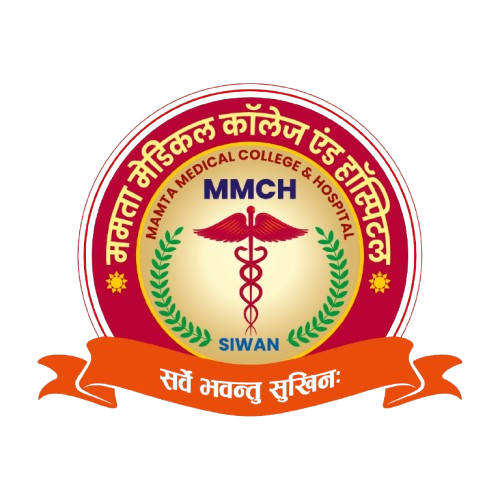
Department of Radiodiagnosis
Mamta Medical College & Hospital, Siwan (MMCH)
The Department of Radiodiagnosis at Mamta Medical College & Hospital (MMCH) stands at the forefront of medical imaging, providing critical diagnostic services that aid in accurate disease detection, patient management, and treatment planning. Equipped with cutting-edge imaging technologies and staffed by expert radiologists, the department plays an indispensable role in the multidisciplinary healthcare team, ensuring timely and precise diagnoses for patients across all specialties.
🌟 Vision & Mission
Vision:
To be a leading radiodiagnostic center recognized for excellence in imaging services, research, and education, enhancing patient care in Siwan and beyond.
Mission:
To deliver accurate, timely, and comprehensive radiological diagnoses using advanced imaging technologies.
To maintain the highest standards of patient safety and comfort during all imaging procedures.
To provide quality education and training to medical students, postgraduates, and radiology trainees.
To foster continuous research and innovation in the field of diagnostic imaging.
To promote awareness about the role of radiodiagnosis in early disease detection and management.
🏥 Clinical Services & Imaging Modalities
The Department of Radiodiagnosis offers a wide range of imaging services, catering to the diverse diagnostic needs of our hospital and community.
Imaging Modalities
X-Ray Radiography: The most fundamental imaging technique for evaluating bone fractures, chest conditions, abdominal abnormalities, and many other clinical conditions. Our department uses digital radiography systems that provide high-quality images with reduced radiation exposure.
Ultrasonography (USG): A safe, non-invasive imaging method using high-frequency sound waves to visualize soft tissues, organs, blood flow, and fetal development. USG is extensively used in obstetrics, abdominal imaging, musculoskeletal evaluation, and guided biopsies.
Computed Tomography (CT): Advanced cross-sectional imaging that provides detailed views of bones, soft tissues, and blood vessels. Our multi-slice CT scanner supports fast, high-resolution scans for trauma, oncology, cardiovascular diseases, and neurological conditions.
Magnetic Resonance Imaging (MRI): An advanced imaging modality that uses magnetic fields and radio waves to produce detailed images of soft tissues, brain, spinal cord, joints, and organs without ionizing radiation. Ideal for neurological, musculoskeletal, and oncologic evaluations.
Interventional Radiology: Minimally invasive, image-guided procedures such as biopsies, drainages, and vascular interventions, performed with precision and safety under imaging guidance.
Mammography: Specialized X-ray imaging for early detection and diagnosis of breast diseases, including breast cancer screening programs.
Other Specialized Imaging
Doppler Ultrasound: For assessing blood flow and vascular abnormalities including deep vein thrombosis, carotid artery disease, and peripheral vascular diseases.
Fluoroscopy: Real-time imaging for gastrointestinal studies and interventional procedures.
👩⚕️ Patient Care & Safety
Patient comfort and safety are paramount in our imaging practices:
We adhere strictly to radiation safety protocols to minimize exposure, especially for children and pregnant women.
Our technologists and radiologists provide clear instructions and support to patients during procedures to ensure comfort and cooperation.
All imaging studies are performed using the latest equipment maintained under strict quality control standards.
Confidentiality and ethical practices are rigorously followed in handling patient data and images.
Prompt reporting and effective communication with referring physicians ensure seamless patient management.
🔬 Research & Innovations
Our department actively participates in research focused on:
Enhancing image quality and diagnostic accuracy with reduced radiation doses.
Development and evaluation of new imaging protocols and contrast agents.
Applications of artificial intelligence (AI) in image analysis and reporting.
Studies on the role of imaging in early cancer detection and treatment response assessment.
Innovations in interventional radiology for minimally invasive therapies.
🤝 Multidisciplinary Collaboration
The Department of Radiodiagnosis collaborates closely with multiple clinical specialties to provide integrated patient care:
Surgery: Preoperative imaging for surgical planning and postoperative assessment.
Oncology: Imaging for tumor detection, staging, and monitoring response to chemotherapy or radiotherapy.
Neurology & Neurosurgery: Detailed neuroimaging for diagnosis of stroke, tumors, degenerative diseases, and trauma.
Orthopedics: Evaluation of fractures, joint diseases, and congenital abnormalities.
Obstetrics & Gynecology: Prenatal imaging and evaluation of gynecological conditions.
Cardiology: Cardiac CT and MRI for evaluation of coronary artery disease and cardiac function.
📢 Patient Preparation & Guidelines
To ensure optimal imaging quality, patients are advised:
To carry previous imaging reports and clinical documents for comparison.
To follow fasting instructions before abdominal ultrasounds or contrast-enhanced scans when applicable.
To inform staff about allergies, especially to contrast agents, and medical history including pregnancy.
To remove metallic objects and wear comfortable clothing during MRI and X-ray procedures.
To cooperate with staff during the examination to achieve accurate and timely results.
